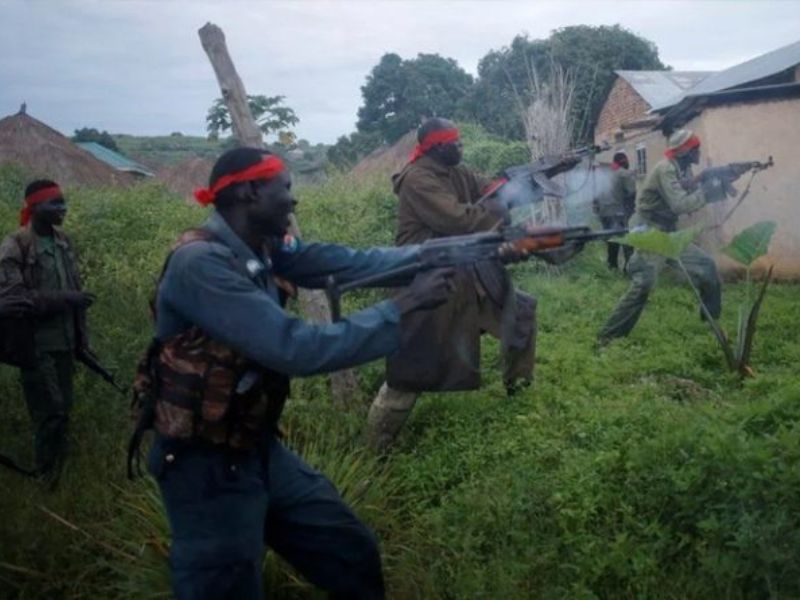Acknowledging the Militant Islamic Fulani Menace in Nigeria

Amid the growing momentum and a presidential announcement to designate Nigeria a Country of Particular Concern (CPC), there is a related aspect going somewhat under the radar — the importance of acknowledging Islamic Fulani militants as an Entity of Particular Concern (EPC).
Though they lack the headline-grabbing cache of Boko Haram’s schoolgirl kidnappings and suicide bombings, Islamic Fulani militants are a more consistent and deadlier predator that hacks, rapes, and burns through one Christian village at a time.
In recent years, these militants have been responsible for far more civilian murders than Boko Haram and ISWAP (ISIS of West Africa) combined. And yet Boko Haram and ISWAP are listed as EPCs, but there is no mention of any such Fulani group.
American missionaries have spoken of an ongoing Islamic Fulani militant campaign of massacres, massive forced displacement, and takeover of increasingly more Nigerian territory.
Nigeria’s Islamic Fulani militants — ranked by the Global Terrorism Index as the world’s fourth-deadliest terrorist group in 2015 — have strangely disappeared from the rankings, despite these militants having grown far more prolific with violence during the last decade.
They have encountered scant meaningful resistance: Even though half of Nigeria is Christian, Muslims have more power at the federal level, especially through the military.
“Nigeria’s security apparatus is dominated by the Fulani,” said Fr. Elijah*, a Catholic priest from northern Nigeria.
An increasing Fulani presence in the nation’s security forces took place during the presidency of Muhammadu Buhari, he added. Buhari, the nation’s leader from 2015 to 2023, was the son of a Fulani chieftain. Under his tenure, Islamic Fulani militancy metastasized in Nigeria.
Fr. Elijah said the current president, Bola Tinubu (who is Muslim but not a Fulani), has made more effort than his predecessor at “trying to strike a balance at the leadership level” between Muslims and Christians.
In the meantime, 2025 has already been one of the most violent years yet for Nigerian Christians, and Islamic Fulani militants have made further lethal inroads into Nigeria’s majority-Christian southern region.
In Fr. Elijah’s view, the hesitation to identify Islamic Fulani militants as a primary source of violence speaks to “the powerful influence the Fulani tribe wields across Africa.”
With a presence in 17 African countries and an overall population of at least 25 million (some estimate double that number), the Fulani reach extends far beyond Nigeria. It overlaps with areas heavily burdened by jihadist violence.
Addressing the large and volatile problem of Islamic Fulani militants requires far more effort than Nigeria’s government and the governments of other nations are currently investing.
“There is no single solution cast in stone,” Fr. Elijah said. “The solution requires a multifaceted approach … I believe a sincere military intervention is necessary. The militants are not ghosts. They can be traced and fought.”
Along with legitimate military intervention, “there is the need to put in place a long-term socio-economic development plan to take care of the widespread poverty prevalent in these communities,” Fr. Elijah said. “Education above all, holds the key. There is the need to take education to the doorsteps of Fulani, especially itinerant ones” (many millions of Fulani remain nomadic).
Not all Fulani are struggling, though. And some who attained wealth in the cattle industry have shown their generosity by giving AK-47 assault rifles to poorer tribesmen.
Nigeria has strict firearm regulations, but enforcement is usually focused on law-abiding citizens. The result is that Christian homes are typically without any realistic method of self-defense.
People often frame Islamic Fulani militant attacks in Nigeria as part of a “farmer-herder conflict.” Using such terms is one way to get around the politically inconvenient reality of Muslims slaughtering Christians.
Look at the way the United Nations sweeps the religious aspect under the rug. The U.N. website mentions the “struggle between herders and farmers in Nigeria” and that it’s “a serious and escalating conflict registering huge casualties.”
Notice how there is no mention about which side, between herders and farmers, has far more weapons and a tendency to perpetrate attacks. Nor is there any mention or suggestion about the religious identity of the ongoing perpetrators.
Now, you might expect the U.N. would feel obligated to weasel away from any religious controversy. And the majority of mainstream media outlets avoid it as well.
Portraying such violence as part of a “conflict” instead of terrorism helps to avoid diplomatic pressure. It additionally affects the allocation of international aid. So, the residents of regions ravaged by Islamic Fulani militants tend to go without assistance, pushed to the category of participants in a farmer-herder “conflict” instead of helpless victims of jihad.
“There is nothing like herder-farmer conflict,” Fr. Elijah said. “It is pure terrorism. Nowhere has there been any farmer or farmers fighting the Fulani tribe. In most cases, sleepy farming communities get invaded at night, and innocent farmers are slaughtered in their sleep.”
Chances are extremely high that, within the next few nights, some band of Islamic Fulani militants will hit yet another Christian community. And chances are almost as high that media outlets and governments will keep sweeping the issue under the rug.
*Some names have been changed to protect identities
To read more news stories, visit the ICC Newsroom. For interviews, please email [email protected]. To support ICC’s work around the world, please give to our Where Most Needed Fund.
